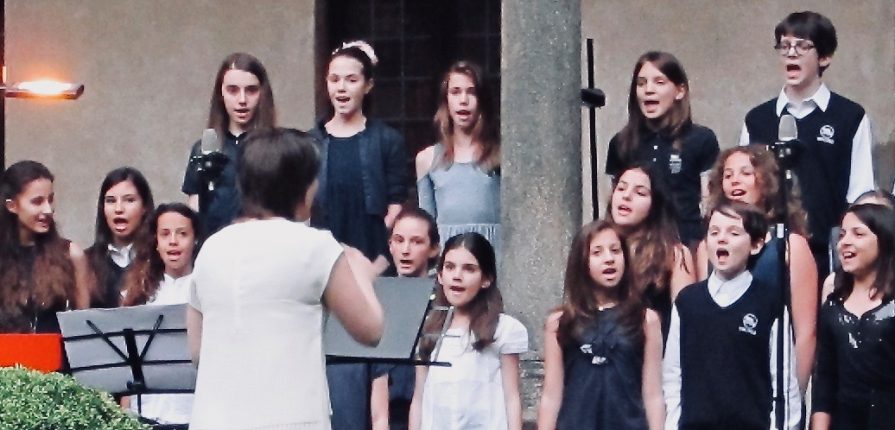I hadn’t expected to ever conduct a choir as part of my musical life. Sing in choirs, sure, but lead one? That part of my journey began thanks to Giuseppe Verdi. Yes, you read that right. Having sung as a classical soprano and having fortuitously wound up teaching music appreciation at the Collegio San Carlo, a bilingual middle school in Milan, I was contacted to help the education department at Orchestra Sinfonica Giuseppe Verdi reach their goal of 100-children-sing-Verdi in 2013, a year of celebration throughout Italy in recognition of their most beloved composer. The gala concert was only a few months away and the orchestra found themselves a bit shy of their goal of 100 participants. After consulting with my boss and mentor, Bruno Mantovani, we decided to form a group of sixth graders to meet weekly to learn the selected repertoire and eventually participate in the big event. Long story short, a group of twelve students was formed, but before rehearsals began we realized that the gala concert conflicted with an important school event. What to do?
We went to the parents with our scheduling conflict and, to our surprise, all twelve families decided that they wanted their kids to follow the rehearsal schedule anyway. So there I was, with twelve kids, a four-month rehearsal schedule, and the freedom to choose six to eight choral pieces to perform at the end of the school year.
I hadn’t looked at a treble choral score in years, but I was pleased to find myself naturally adept at analyzing pieces for their pedagogical merits. I knew what I wanted: a program, short as it was, with pieces that were range-appropriate (I’m sick of hearing school children sing pop songs that are too low for them. Who’s with me?), written in parts (yes, kids can –and should– sing in parts!), that featured a variety of styles appealing to the students, our school community, and me. As I set about selecting repertoire, I was afraid finding pieces to fit all of these criteria would be a near impossible challenge. The kids were sixth graders, after all, in a culture that despite its incredible musical heritage is sadly lagging in efforts to bring up sophisticated listeners. Luckily, there are some fantastic composers of treble choral music out there! I remember one of the group’s favorite pieces, a seemingly simple arrangement of folk songs, that to my ear was also preparation for masterful, contrapuntal singing. Other pieces in the program introduced the kids to meter changes and complex harmonies. For the kids and most of our eventual audience members, each piece was perfectly satisfying in and of itself. For me, each piece seemed to indicate a road down which we might one day explore all of the subtle challenges presented by choral masterworks.
After the second rehearsal, I was hooked. I love directing youth choirs! Just as I used to invest time and resources in private lessons, masterclasses, and workshops for solo singing, I’m now always on the lookout for the many rich training and refining opportunities out there for choral educators. There is a significant difference now in the outcomes of such investments. I walk away, as before, inspired by new ideas, enriched by shared experiences, and in contact with new mentors and colleagues, but in the ensuing months, I get to see those outcomes reflected back at me in the faces of young singers, eagerly discovering their voices and the many joys of collective singing.



Leave a Reply
You must be logged in to post a comment.